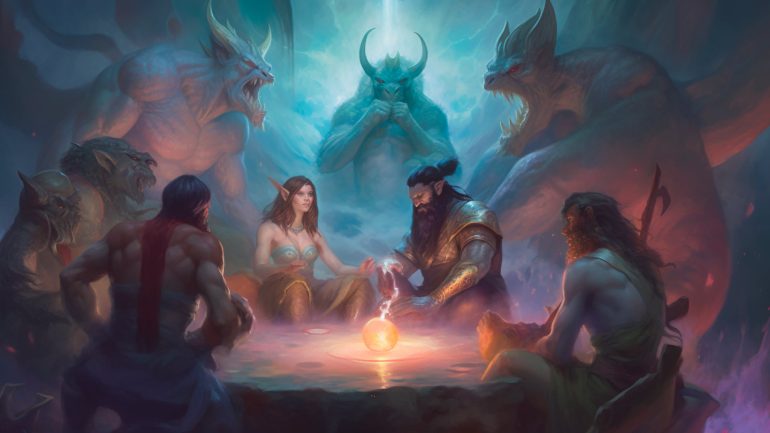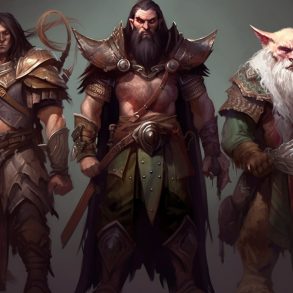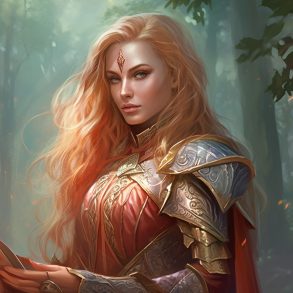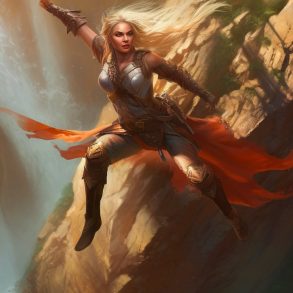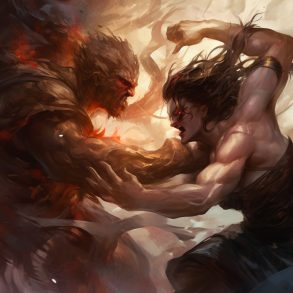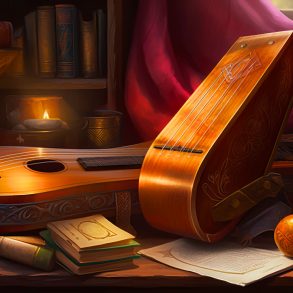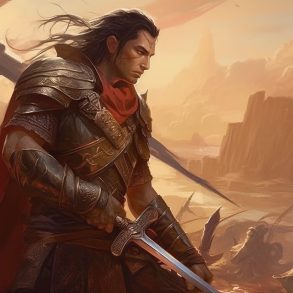Deities and their various pantheons are a vast topic with a wealth of lore to draw upon, in this article we’ll cover some of the basics of the gods of DnD that should get you inspired to roll up your next devout adventurer… or at the very least, give you a better understanding on the many almighty things in DnD.
The 107 DnD deities usually function in a very clear way: they are real, inhabitants of the world know that they are real, and they interact with the world using their power. Either directly: The creation of races, divine punishments, etc. Or indirectly: providing power to Clerics and Paladins, or influencing inhabitants of the world to carry out their desires.
They are beings of vast power, knowledge, and influence; this usually leads to a player somewhere asking, where do they live, and can I kill them for a cool new sword? In 5th edition, the gods are not provided statblocks like other creatures, and killing them is usually a matter for other gods or campaign-defining artifacts. There is one exception to this rule, however, the evil dragon goddess, Tiamat–the overarching antagonist of the Tyranny of Dragons storyline which plays out across Hoard of the Dragon Queen and Rise of Tiamat. Within the latter adventure is a full statblock for the goddess, so if you want to oil your blade and have at it, well, uh, good luck with that!
Each campaign setting has its own rules for gods as well as their own pantheons, though some gods appear in multiple campaign settings, they can be a little different, primarily in the role they’ve played in that world. To clarify, Tyr can be found in both Forgotten Realms and Greyhawk, and he is similar in both, but this is not the same Tyr.
Table of Contents
Forgotten Realms Deities
The default setting for 5E, the Forgotten Realms pantheon is richly fleshed out in the Player’s Handbook, Sword Coast Adventurer’s Guide, and a variety of novels and previous edition supplements. Something worth keeping in mind: the rules of the world change every edition and you’ll want to confirm these older sources are valid with your DM.
In the Forgotten Realms, each god has their own portfolio they preside over, such as death, war, and so on. No two gods can have the same portfolio; if a conflict happens, then either one god must change their portfolio, be destroyed, or the two gods must merge into a singular deity. The portfolio of each god is determined and enforced by the overgod, Ao, a being of limitless power over everything within the crystal sphere the Forgotten Realms resides in (don’t worry, we’ll explain what a crystal sphere is in another article!).
The gods of the Forgotten Realms are:
- Auril – Neutral Evil goddess of winter (antagonist of the Rime of the Frost Maiden adventure)
- Azuth – Lawful Neutral god of Wizards
- Bane – Lawful Evil god of murder
- Beshaba – Chaotic Evil goddess of misfortune
- Bhaal – Neutral Evil god of murder
- Chauntea – Neutral Good goddess of agriculture
- Cyric – Chaotic Evil god of lies
- Deneir – Neutral Good god of writing
- Eldath – Neutral Good goddess of peace
- Gond – Neutral god of craft
- Helm – Lawful Neutral god of protection
- Ilmater – Lawful Good god of endurance
- Kelemvor – Lawful Neutral god of the dead
- Lathander – Neutral Good god of birth and renewal
- Leira – Chaotic Neutral goddess of illusion
- Lliira – Chaotic Neutral goddess of joy
- Loviatar – Lawful Evil goddess of pain
- Malar – Chaotic Evil god of the hunt
- Mask – Chaotic Neutral god of thieves
- Mielikki – Neutral Good goddess of forests
- Milil – Neutral Good god of poetry and song
- Myrkul – Neutral Evil god of death
- Mystra – Neutral Good goddess of magic
- Oghma – Neutral god of knowledge
- Savras – Lawful Neutral god of divination and fate
- Selûne – Chaotic Good goddess of the moon
- Shar – Neutral Evil goddess of darkness and loss
- Silvanus – Neutral god of wild nature
- Sune – Chaotic Good goddess of love and beauty
- Talona – Chaotic Evil goddess of disease and poison
- Talos – Chaotic Evil god of storms
- Tempus – Neutral god of war
- Torm – Lawful Good god of courage and self-sacrifice
- Tymora – Chaotic Good goddess of luck
- Tyr – Lawful Good god of justice
- Umberlee – Chaotic Evil goddess of the sea
- Waukeen – Neutral goddess of trade
Greyhawk Deities
The original setting for DnD, created by one of its founding members, Gary Gygax for his home game. The setting is not widely used in official materials, however, the compilation adventures Tales from the Yawning Portal and Ghosts of Saltmarsh take place there. Over the years, the pantheon for Greyhawk expanded greatly from its origins, with some of its deities being portrayed in other settings (as found in the non-human deities list below).
The listed Greyhawk deities in 5E are:
- Beory – Neutral goddess of nature
- Boccob – Neutral god of magic
- Celestian – Neutral god of stars and wanderers
- Ehlonna – Neutral Good goddess of woodlands
- Erythnul – Chaotic Evil god of envy and slaughter
- Fharlanghn – Neutral Good god horizons and travel
- Heironeous – Lawful Good god of chivalry and valor
- Hextor – Lawful Evil god of war and discord
- Kord – Chaotic Good god of athletics and sport
- Incabulos – Neutral Evil god of plague and famine
- Istus – Neutral goddess of fate and destiny
- Iuz – Chaotic Evil god of pain and oppression
- Nerull – Neutral Evil god of death
- Obad-Hai – Neutral god of nature
- Olidammara – Chaotic Neutral god of revelry
- Pelor – Neutral Good god of the sun and healing
- Pholtus – Lawful Good god of light and law
- Ralishaz – Chaotic Neutral god of ill luck and insanity
- Rao – Lawful Good god of peace and reason
- St. Cuthbert – Lawful Neutral god of common sense and zeal
- Tharizdun – Chaotic Evil god of eternal darkness
- Trithereon – Chaotic Good god of liberty and retribution
- Ulaa – Lawful Good goddess of hills and mountains
- Vecna – Neutral Evil god of evil secrets
- Wee Jas – Lawful Neutral goddess of magic and death
Eberron Deities
The world of Eberron has a different take on gods: you don’t know if they exist for sure or if the effects created by the likes of Clerics are some other form of magic. In Eberron, there is the creation story, where three dragons–Siberys, Eberron, and Khyber–created the planes before Khyber turned on the others. Siberys was killed and their body became the ring of ‘dragonshards’ around the planet. Eberron fought Khyber but was unable to defeat her. Instead, he became a living prison to contain her, forming the planet around the betraying dragon, in the process giving us the planet and its name.
This creation story doesn’t really leave the inhabitants of Eberron with deities to worship, so who do they worship? It varies, but the nature of the world means some people can follow gods who don’t manifest in the world. Others follow philosophies or may be atheists who don’t believe in any gods because there’s no concrete proof they actually exist beyond manifestations of the faithful’s willpower.
Some examples of what you may believe in and follow in the world of Eberron:
The Sovereign Host Deities
- Arawai – Neutral Good goddess of fertility
- Aureon – Lawful Neutral god of law and knowledge
- Balinor – Neutral god of beasts and the hunt
- Boldrei – Lawful Good goddess of community and home
- Dol Arrah – Lawful Good goddess of sunlight and honor
- Dol Dorn – Chaotic Good god of strength at arms
- Kol Korran – Neutral god of trade and wealth
- Ollandra – Neutral Good goddess of good fortune
- Onatar – Neutral Good god of craft
The Dark Six Deities
- The Devourer – Neutral Evil god of nature’s wrath
- The Fury – Neutral Evil goddess of wrath and madness
- The Keeper – Neutral Evil god of greed and death
- The Mockery – Neutral Evil god of violence and treachery
- The Shadow – Chaotic Evil god of dark magic
- The Traveler – Chaotic Neutral deity of chaos and change
Other Faith Deities
- The Silver Flame – Lawful Good deity of protection and good
- The Blood of Vol – Lawful Neutral philosophy of immortality and undeath
- Cults of the Dragon Below – Neutral Evil deities of madness
- The Path of Light – Lawful Neutral philosophy of light and self-improvement
- The Undying Court – Neutral Good elven ancestors
- The Spirits of the Past – Chaotic Good elven ancestors
Non-Human Deities
The following deities are traditionally worshiped by nonhuman races, a mixture of monstrous races (like Kuo-toa), and player races like elves and halflings. These deities are found in multiple campaign settings and are rich in lore, some of which can be found in Mordenkainen’s Tome of Foes.
- Bahamut – Lawful Good dragon god of good
- Blibdoolpoolp – Neutral Evil kuo-toa goddess
- Corellon Larethian – Chaotic Good elf deity of art and magic
- Deep Sashelas – Chaotic Good elf god of the sea
- Eadro – Neutral merfolk deity of the sea
- Garl Glittergold – Lawful Good gnome god of trickery and wiles
- Grolantor – Chaotic Evil hill giant god of war
- Gruumsh – Chaotic Evil orc god of storms and war
- Hruggek – Chaotic Evil bugbear god of violence
- Kutrulmak – Lawful Evil god of war and mining
- Laogzed – Chaotic Evil troglodyte god of hunger
- Lolth – Chaotic Evil goddess of spiders
- Maglubiyet – Lawful Evil goblinoid god of war
- Moradin – Lawful Good dwarf god of creation
- Rilifane Rallathil – Chaotic Good wood elf god of nature
- Sehanine Moonbow – Chaotic Good elf goddess of the moon
- Sekolah – Lawful Evil sahuagin god of the hunt
- Semuanya – Neutral lizardfolk deity of survival
- Skerrit – Neutral centaur and satyr god of nature
- Skoraeus Stonebones – god of stone giants and art
- Surtur – Lawful Evil god of fire giants and craft
- Thrym – Chaotic Evil god of frost giants and strength
- Tiamat – Lawful Evil goddess of evil
- Yondalla – Lawful Good halfling goddess of fertility and protection
Whatever your chosen faith, or lack thereof, is outside of Dungeons & Dragons 5E, it’s undeniable the sheer lore given in this edition, through deities alone, provides more richness most DMs and players will know what to do with. The best part? Any of these gods can be useful for any class. Your rogue PC could have a nightly ritual dedicated to Mask; your bard gives a quick prayer to Milil; even a wizard might seek a temple of Oghma to hasten their research.
So what are you waiting for? Get your sacrifice ready or prepare a prayer for good fortune to find you with any of these deities.
